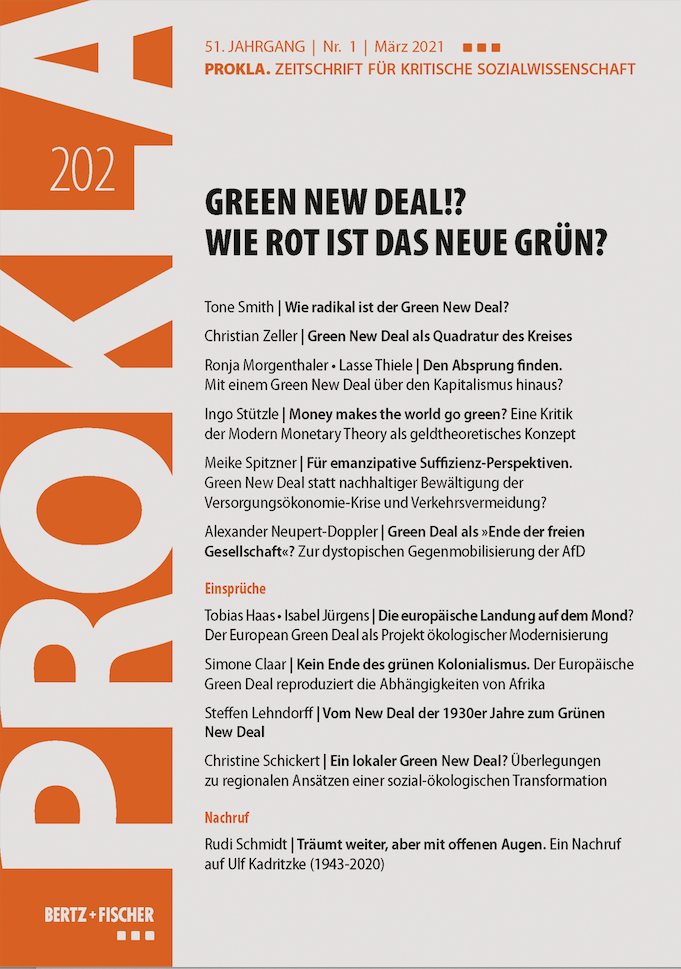How radical is the Green New Deal?
DOI:
https://doi.org/10.32387/prokla.v51i202.1928Keywords:
ecological economics, green growth, degrowth, work, imperial mode of livingAbstract
The idea of a Green New Deal (GND) is not new, but the last couple of years have seen the development of a range of - more or less radical - proposals, especially from left-wing groups. This article analyses four GND proposals and ask whether they are radical enough to provide a basis for the needed social-ecological transformation. Although there are many progressive and radical elements in these proposals, the article concludes that they do not go far enough. The main problem is that a New Deal is by its very nature an economic growth-project, and hence furthers the myth of the possibility of green growth.
Downloads
References
Actionaid / Corporate Accountability / Friends of the Earth International / Global Campaign to Demand Climate Justice / Third World Network / What next? (2020): NOT ZERO: How ›net zero› targets disguise climate inaction. Joint technical briefing by climate justice organisations.
Adler, David / Wargan, Pawel (o.J.): 10 Säulen des Green New Deals für Europa. The Green New Deal for Europe.
Adler, David / Wargan, Pawel / Prakash, Sona (Hg.) (2019): Roadmap. Für Europas sozial-ökologische Wende.The Green New Deal for Europe.
Anderson, Kevin (2019): Brief response to the UK Government’s »net-zero« proposal. URL: https://kevinanderson.info/blog/brief-response-to-the-uk-governments-net-zero-proposal/, Zugriff: 15.10.2019.
Brand, Ulrich (2014): Social ecological transformation: a crossover project between the left and the greens?URL: https://www.degrowth.info/en/2014/05/social-ecological-transformation-a-crossover-project-between-the-left-and-the-greens/#more-26523, Zugriff: 1.12.2020.
Brand, Ulrich/ Wissen, Markus (2017): The imperial mode of living. In Spash, Clive L. (Hg.): Routledge Handbook of Ecological Economics. Nature and Society. Abingdon-New York: 152-161.
Candeias, Mario (2013): Green Transformation. Competing strategic projects. Berlin.
Chang, Ha-Joon (2011): 23 things they don’t tell you about capitalism. London.
Europäische Kommission (2019): Der europäische Grüne Deal. COM (2019) 640 final.
Galtung, Johan: A Structural Theory of Imperialism, In: Journal of Peace Research 8(2): 81-117.
GCEC (2014): Better Growth Better Climate. The New Climate Economy Report. Washington, D.C.
GCEC (2015): Seizing the Global Opportunity. The 2015 New Climate Economy Report. Washington/D.C.
Giampietro, Mario (2019): On the circular bioeconomy and decoupling: Implications for sustainable growth. In: Ecological Economics 162: 143–156. DOI: https://doi.org/10.1016/j.ecolecon.2019.05.001.
Graeber, David (2018): Bullshit Jobs: A Theory. London.
Hache, Frederic (2020): 50 Shades of Green. Sustainable Finance 2.0. The securitization of climate and biodiversity policies. Green Finance Observatory. Brüssel.
Hoffmann, Maja / Paulsen, Roland (2020): Resolving the ›jobs-environment-dilemma‹? The case for critiques of work in sustainability research. In: Environmental Sociology 6(4): 343-354. DOI: https://doi.org/10.1080/23251042.2020.1790718.
Kothari, Ashish/Shrivastava, Aseem(2012): Why Is India Still Poor? In: Yes! Magazine, June 2012.
Mair, Simon / Druckman, Angela / Jackson, Tim (2020): A tale of two utopias: Work in a post-growth world. In: Ecological Economics 173: 1-11.
Mazzucato, Mariana / McPherson, Martha (2018): The Green New Deal: A bold mission-oriented approach. UCL: Institute for Innovation and Public Purpose.
Muraca, Barbara (2013): Décroissance: A Project for a Radical Transformation of Society. In: Environmental Values 22(2): 147-169.
Sachs, Wolfgang (2015): Planet dialectics: Explorations in environment and development. London.
Simon, Frédéric (2020): France, Germany join group of 10 EU countries calling for green recovery. URL: https://www.euractiv.com/section/energy-environment/news/france-germany-join-group-of-10-eu-countries-calling-for-green-recovery/, Zugriff: 19.1.2021.
Spash, Clive L. (2016):The political economy of the Paris Agreement on human induced climate change: a brief guide. In: Real-World Economics Review 75: 67-75.
– (2020): Apologists for growth: passive revolutionaries in a passive revolution. In: Globalizations. DOI: http://doi.org10.1080/14747731.2020.1824864.
– / Smith, Tone (2019): Of ecosystems and economics: re-connecting economics with reality. In: Real World Economics Review 87: 212-229.
Stern, Nicholas u.a. (2006): Stern Review: The Economics of Climate Change. London.
Taylor, Matthew (2019): Labour members launch Green New Deal inspired by US activists (22.3.2019). URL: www.theguardian.com, Zugriff: 22.3.2019.
The Green New Deal Group (2008): A Green New Deal. Joined-up policies to solve the triple crunch of the credit crisis, climate change and high oil prices: New Economics Foundation.






